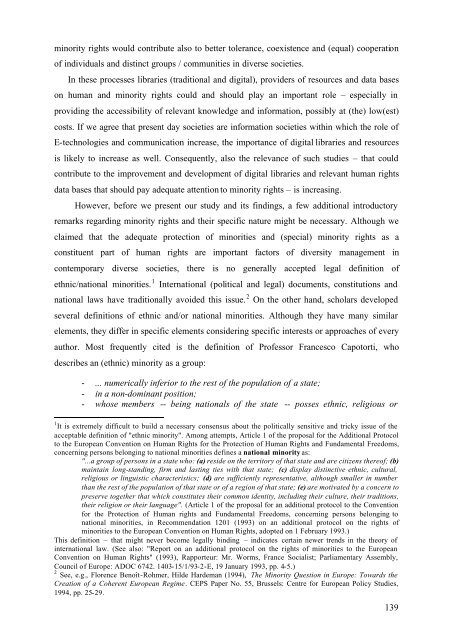Winds of Change - Centar za ljudska prava Univerziteta u Sarajevu ...
Winds of Change - Centar za ljudska prava Univerziteta u Sarajevu ...
Winds of Change - Centar za ljudska prava Univerziteta u Sarajevu ...
You also want an ePaper? Increase the reach of your titles
YUMPU automatically turns print PDFs into web optimized ePapers that Google loves.
minority rights would contribute also to better tolerance, coexistence and (equal) cooperation<br />
<strong>of</strong> individuals and distinct groups / communities in diverse societies.<br />
In these processes libraries (traditional and digital), providers <strong>of</strong> resources and data bases<br />
on human and minority rights could and should play an important role – especially in<br />
providing the accessibility <strong>of</strong> relevant knowledge and information, possibly at (the) low(est)<br />
costs. If we agree that present day societies are information societies within which the role <strong>of</strong><br />
E-technologies and communication increase, the importance <strong>of</strong> digital libraries and resources<br />
is likely to increase as well. Consequently, also the relevance <strong>of</strong> such studies – that could<br />
contribute to the improvement and development <strong>of</strong> digital libraries and relevant human rights<br />
data bases that should pay adequate attention to minority rights – is increasing.<br />
However, before we present our study and its findings, a few additional introductory<br />
remarks regarding minority rights and their specific nature might be necessary. Although we<br />
claimed that the adequate protection <strong>of</strong> minorities and (special) minority rights as a<br />
constituent part <strong>of</strong> human rights are important factors <strong>of</strong> diversity management in<br />
contemporary diverse societies, there is no generally accepted legal definition <strong>of</strong><br />
ethnic/national minorities. 1 International (political and legal) documents, constitutions and<br />
national laws have traditionally avoided this issue. 2 On the other hand, scholars developed<br />
several definitions <strong>of</strong> ethnic and/or national minorities. Although they have many similar<br />
elements, they differ in specific elements considering specific interests or approaches <strong>of</strong> every<br />
author. Most frequently cited is the definition <strong>of</strong> Pr<strong>of</strong>essor Francesco Capotorti, who<br />
describes an (ethnic) minority as a group:<br />
- ... numerically inferior to the rest <strong>of</strong> the population <strong>of</strong> a state;<br />
- in a non-dominant position;<br />
- whose members -- being nationals <strong>of</strong> the state -- posses ethnic, religious or<br />
1 It is extremely difficult to build a necessary consensus about the politically sensitive and tricky issue <strong>of</strong> the<br />
acceptable definition <strong>of</strong> "ethnic minority". Among attempts, Article 1 <strong>of</strong> the proposal for the Additional Protocol<br />
to the European Convention on Human Rights for the Protection <strong>of</strong> Human Rights and Fundamental Freedoms,<br />
concerning persons belonging to national minorities defines a national minority as:<br />
"...a group <strong>of</strong> persons in a state who: (a) reside on the territory <strong>of</strong> that state and are citizens there<strong>of</strong>; (b)<br />
maintain long-standing, firm and lasting ties with that state; (c) display distinctive ethnic, cultural,<br />
religious or linguistic characteristics; (d) are sufficiently representative, although smaller in number<br />
than the rest <strong>of</strong> the population <strong>of</strong> that state or <strong>of</strong> a region <strong>of</strong> that state; (e) are motivated by a concern to<br />
preserve together that which constitutes their common identity, including their culture, their traditions,<br />
their religion or their language". (Article 1 <strong>of</strong> the proposal for an additional protocol to the Convention<br />
for the Protection <strong>of</strong> Human rights and Fundamental Freedoms, concerning persons belonging to<br />
national minorities, in Recommendation 1201 (1993) on an additional protocol on the rights <strong>of</strong><br />
minorities to the European Convention on Human Rights, adopted on 1 February 1993.)<br />
This definition – that might never become legally binding – indicates certain newer trends in the theory <strong>of</strong><br />
international law. (See also: "Report on an additional protocol on the rights <strong>of</strong> minorities to the European<br />
Convention on Human Rights" (1993), Rapporteur: Mr. Worms, France Socialist; Parliamentary Assembly,<br />
Council <strong>of</strong> Europe: ADOC 6742. 1403-15/1/93-2-E, 19 January 1993, pp. 4-5.)<br />
2 See, e.g., Florence Benoît-Rohmer, Hilde Hardeman (1994), The Minority Question in Europe: Towards the<br />
Creation <strong>of</strong> a Coherent European Regime. CEPS Paper No. 55, Brussels: Centre for European Policy Studies,<br />
1994, pp. 25-29.<br />
139





